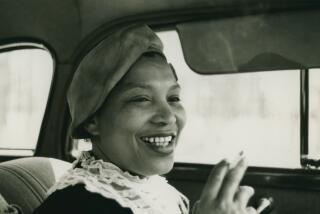Dorothy West; Harlem Literary Icon
- Share via
Dorothy West, the last surviving literary icon of the 1920s Harlem Renaissance that propelled African American writing, painting and drama dramatically into the mainstream, has died. She was 91.
West, who published only two major novels nearly half a century apart, died Sunday at New England Medical Center in Boston. She had lived for many years in Oak Bluffs on Martha’s Vineyard.
The writer outlived many of her contemporaries, including poet Langston Hughes, novelist Zora Neale Hurston and editor and novelist Wallace Thurman, and watched calmly as her early fame drifted into obscurity and then rose again late in her life.
“I’m very lucky to be alive . . . to be recognized, because so many other young people died--because they had tuberculosis, or you bought liquor and sometimes it wasn’t any good. Sometimes you died from it,” she told The Times in 1995, shortly before her second novel, “The Wedding,” was published. “So whenever we talk about the Harlem Renaissance, I’m always a bit moved.”
Born to a rich Boston produce dealer who had been born a slave, West moved to New York in 1926 when she and Hurston tied for second place in a short story writing contest. West began her career as a journalist, short story writer and novelist by founding a literary journal “Challenge” and co-founding its successor “New Challenge.” With her hungry young colleagues, she hung out at Thurman’s donated loft.
“We thought we were going to be the greatest writers in the world. . . . We were all young, and we fell in love with each other. We were all the same age, and we all had the same ambitions--writers or painters or so forth. We had all come from small towns. We were free. . . . We were young enough that [lack of] food didn’t bother us,” she told The Times.
She dated the end of the Harlem Renaissance to Thurman’s death in 1934, explaining: “Because then we could see that we could die. We didn’t know that before. . . . Some went back to school. I came back to Massachusetts.”
In 1948, West published her first novel, “The Living Is Easy,” drawing on her upper-class background and the experiences of her emancipated slave father. She wrote dozens of short stories and literary essays and stories for the Vineyard Gazette on the island where she had lived since 1947.
West began working on “The Wedding,” based on Oak Bluff society, in the 1960s, but abandoned it when black militancy came to the fore. She was encouraged to finish the book by Doubleday editor and part-time Martha’s Vineyard resident Jacqueline Kennedy Onassis, who liked West’s writing in the Vineyard Gazette.
After “The Wedding” sold well in the spring of 1995, Doubleday published that summer a collection of West’s short stories and reminiscences, “The Richer, The Poorer.”
A Times reviewer described “The Wedding” as “a novel of manners” that “deftly satirizes a corridor of black Boston elite.” An expert on African American studies, the reviewer praised West for a thorough examination of class and race and compared her book favorably to “The Great Gatsby.” Oprah Winfrey turned the book into a television miniseries this year.
Another Times reviewer noted that West’s stories contained in “The Richer, The Poorer” demonstrated the author’s “strong, distinctive, unsentimental voice.” West, he concluded, wrote “like a social historian.”
That collection included many of West’s writings from the Vineyard Gazette and the 1926 short story, “The Typewriter,” which made her a contest finalist and took her to New York to become part of the Harlem Renaissance.
Asked by The Times in 1995 what she wanted her legacy to be, West replied: “That I hung in there. That I didn’t say, ‘I can’t.’ ”
More to Read
Sign up for our Book Club newsletter
Get the latest news, events and more from the Los Angeles Times Book Club, and help us get L.A. reading and talking.
You may occasionally receive promotional content from the Los Angeles Times.










